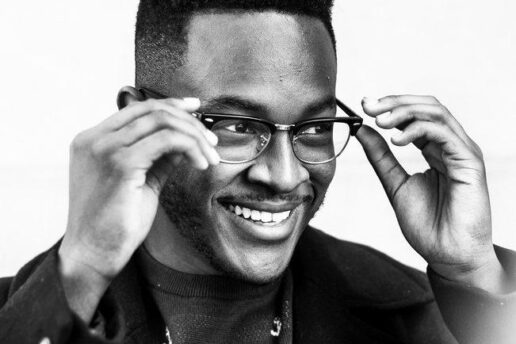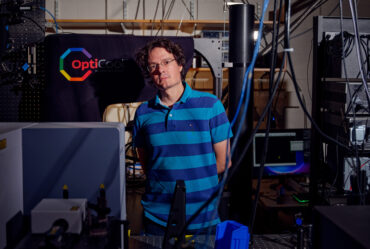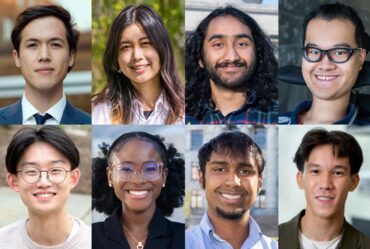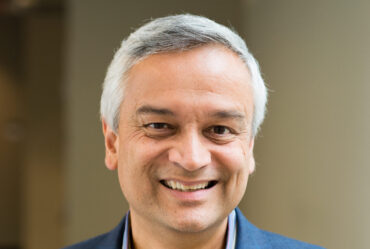
Senior Kofi Blake named 2021 Knight-Hennessy Scholar
Fellowship funds graduate studies at Stanford University.
Six MIT affiliates have been selected for the newest cohort of the prestigious Knight-Hennessy Scholars program. Kofi Blake, Orisa Coombs, Jierui Fang ’20, Max Kessler ’20, Claire Lazar Reich ’17, and Kyle Swanson ’18, MEng ’19 will begin graduate studies at Stanford University this fall.
Founded in 2018, the Knight-Hennessy Scholars program seeks to cultivate a diverse, multidisciplinary community of future leaders and prepare them to address global challenges. The highly competitive fellowship, which fully funds graduate studies in any field at Stanford University, attracts applicants from around the globe.
In addition to funding, Knight-Hennessy Scholars receive leadership development training, mentorship, and experiential learning opportunities. Since the program’s inception, 11 MIT affiliates — students and alumni — have been awarded Knight-Hennessy Scholarships.
“Every year, we have the remarkable job of supporting brilliant young MIT students who seek to transform the world,” says Kim Benard, assistant dean of distinguished fellowships in Career Advising and Professional Development. “This year, despite immense challenges, we had a record number of students selected for the Knight-Hennessy Scholarship. This is a testament to their resiliency and dedication. What is even more impressive is that Kofi, Orisa, Jierui, Max, Claire, and Kyle will all contribute to an array of issues that demonstrates the magnitude of an MIT education from advocacy to design to medicine to engineering. They make us all proud that they will be representing MIT.”
Kofi Blake
Senior Kofi Blake, from Broward County, Florida, will graduate in June with double majors in aerospace engineering and physics, and a political science minor. As a Knight-Hennessy Scholar, Blake will pursue a PhD in aeronautics and astronautics at Stanford School of Engineering. Blake aspires to research new forms of space propulsion, while also advocating for social justice and inclusion in engineering. He has conducted research on the modeling of electrospray thrusters in the MIT Space Propulsion Lab, and at Imperial College London he developed a hall thruster with a novel use of a microwave antenna. As the first engineer assigned to the rocket, he had the honor of naming it. Throughout all four years at MIT, Blake served as president of his class and was an active resident of the Chocolate City living community. He is now co-chair of the brotherhood organization, which is dedicated to the leadership development of Black and minority men. Blake also volunteered as an aerospace instructor for a STEM enrichment program that serves underrepresented students.
Orisa Coombs
Senior Orisa Coombs hails from Aurora, Colorado, and will receive her bachelor’s degree in mechanical engineering this June. In the fall, she will begin a PhD program in mechanical engineering at Stanford School of Engineering. Coombs aims to be a professor and contribute to research in the area of energy and sustainability technology. Previously, she explored the medical device industry through internships at Johnson and Johnson and SpineFrontier. At the MIT Media Lab, she designed wearable devices to continuously monitor biomarkers like cortisol in astronauts in the International Space Station. However, Coombs discovered her passion in climate change research. In the Rosenhow Kendall Lab, she researched efficient water desalination methods for long-term water sustainability. Coombs has also served as the chair of the MIT Black Student’s Union, and as a representative on Institute Diversity Equity and Inclusion Policy committees. She has worked to eliminate food insecurity across the MIT campus through dorm food pantry initiatives and the design of an on-campus at-cost grocery store.
Jierui Fang ’20
Jierui Fang ’20, from Plano, Texas, graduated MIT as an art and design major with minors in computer science and biomedical engineering. She envisions a future career creating change through interdisciplinary design with system-based products and experiences, specifically in the fields of healthcare, sustainability, and experiential art. At Stanford School of Engineering she will embark on a master’s degree in design impact. Fang has conducted research on medical maker technologies and experimented with biomaterial fabrication at MIT, designed solutions for refugees as part of startup and as a fellow at U.S. Citizenship and Immigration Services, and led an augmented reality mural project with international collaborators. Since graduation, she has worked as a design strategist at Tidepool for an automated insulin delivery system that was recently submitted to the U.S. Food and Drug Administration. She has had her work exhibited at the Philadelphia Museum of Art and by the Cooper Hewitt at the Gates Discovery Center.
Max Kessler ’20
Recent graduate Max Kessler ’20, from Friday Harbor, Washington, earned a bachelor’s degree in mechanical engineering. A winner of the Fulbright fellowship, he is currently in Germany researching and developing a bio-inspired suction cup to reduce the energy intensity of industrial processes. As a Knight-Hennessy Scholar, Kessler will pursue a PhD in mechanical engineering at Stanford School of Engineering. Passionate about addressing climate change, Kessler aspires to develop innovative technologies to reduce emissions in the built environment. To communicate his research and share stories with wide audiences, he has directed many short movies, including an award-winning documentary about sustainability and climate action. Kessler strives to be a global citizen. He has interned at the United Nations, and during his time at MIT he worked on a project to supply custom sleeping bags to people displaced from their homes in the Middle East.
Claire Lazar Reich ’17
Economics and statistics doctoral student Claire Lazar Reich ’17 hails from northern New Jersey. She graduated MIT with a bachelor of science in mathematics and will receive her PhD this year. Lazar Reich will complete her JD studies at Stanford Law School. She plans to use her legal education to contribute to financial regulation and technology law. Her PhD research demonstrates how algorithms in use today can be made simultaneously fairer and more accurate at a time when they increasingly guide access to financial opportunities, medical treatments, and bail decisions. In college, Lazar Reich volunteered as an EMT, served as an editor at MIT’s student newspaper The Tech, and conducted research at Wrightson ICAP, Caltech, and the MIT Laboratory for Financial Engineering. During her PhD studies, she was awarded the MIT Presidential Fellowship and the NSF Graduate Research Fellowship.
Kyle Swanson ’18, MEng ’19
Kyle Swanson ’18, MEng ’19, from Bronxville, New York, graduated from MIT with a bachelor’s degree in computer science and mathematics and a master’s degree in computer science. After winning a Marshall Scholarship, he went on to receive a master’s degree in mathematics from the University of Cambridge and a master’s degree in biotechnology from Imperial College London. At the Stanford School of Engineering he will earn a PhD in computer science. Swanson aims to apply machine learning to tackle complex problems in biology and health care. While at MIT, he worked with Professor Regina Barzilay to develop a machine learning model that can determine an individual’s risk of developing breast cancer from a mammogram; this model has helped assess tens of thousands of mammograms at Massachusetts General Hospital. He also applied machine learning to chemistry, resulting in the discovery of halicin, the first antibiotic identified by artificial intelligence.


